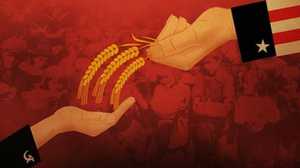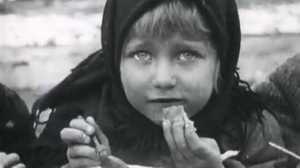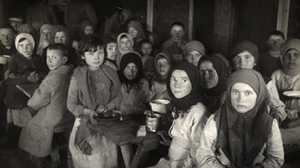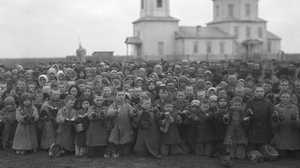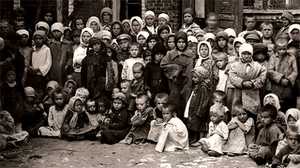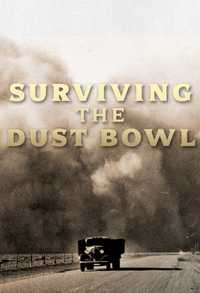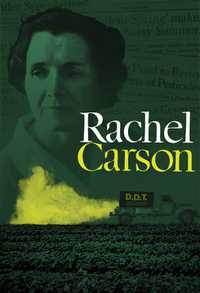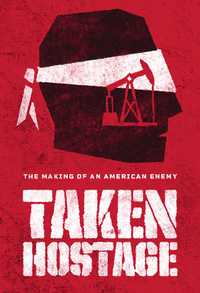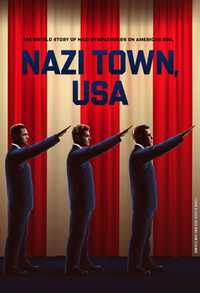Will Shafroth (Ivan Bronevoy): December 4th, 1921. Samara District, Soviet Russia. Today I came upon a group of men in a makeshift cemetery digging a mass grave. When I asked where the bodies were, one of them explained, "We are trying now to make a place to put the future corpses. We are afraid we won't have the strength do to it later."
As I looked at them, I wondered if any of those men thought he might be digging his own grave. Will Shafroth, American Relief Administration.
Narrator: In July 1921, noted Russian author Maxim Gorky issued a plea to the West.
"Gloomy days have come for the country of Tolstoy, Dostoyevsky, Mendeleyev," Gorky wrote. "I ask for prompt aid to the Russian people. Give bread and medicine."
Gorky never mentioned Vladimir Lenin or his Bolshevik revolution.
Russia had suffered a drought, which was not unusual. The famine of 1921 was. It would become the worst natural disaster in Europe since the Black Plague in the Middle Ages.
Ronald Suny, Historian: There was this historical coincidence of a number of social forces: the collapse of the tsarist regime, the outbreak of civil war, the policies of the Bolsheviks themselves. The government carried out mass requisitioning of grain, which prevented peasants from feeding themselves or even having enough seed to carry on next season planting a new crop.
Narrator: Herbert Hoover, the new Secretary of Commerce under President Warren Harding, spotted Gorky's plea in a newspaper. Hoover was also the director of the American Relief Administration, known as the ARA.
Bertrand M. Patenaude, Historian: For most Americans, Herbert Hoover is associated with the Great Depression. But back in the 1920s his image was one of being a very efficient, a hardheaded humanitarian who knew how to get the food through.
Narrator: No one in the West had better credentials to answer Gorky's request than Herbert Hoover.
Hoover was a Stanford-trained mining engineer who had operated in Australia, China and Russia's Ural mountains and knew the logistics of moving men and materiel around the world. When World War I broke out, he was asked to organize the relief of an entire nation.
George H. Nash, Hoover Biographer: There were seven million Belgians living under German occupation. So it became Hoover's responsibility to provide daily food assistance that would keep all those people alive. And Hoover showed that he had the administrative talents as well as the humanitarian sympathies to pull this off. And he became an American hero and even an international hero.
Narrator: After the war, the Paris Peace Conference asked the United States to feed tens of millions in 21 countries throughout war torn Europe and the Near East. The U.S. created the ARA, with Herbert Hoover as its head.
George H. Nash, Hoover Biographer: It has been said, and I think correctly, that Herbert Hoover was responsible for saving more lives than any person who has ever lived.
Narrator: He became known as the "Master of Emergencies" and the "Great Humanitarian." The embodiment of an America proud of its newfound sense of itself as an altruistic nation. Hoover accepted Russia's plea for help.
Will Shafroth, 29, son of the governor of Colorado, joined other famine relief workers from the United States and headed for Moscow. Spurred by a sense of adventure and altruism, "Hoover's boys", as they came to be known, had done relief work after World War I and represented an America that emerged from the war as a world power. Now their idealism would be tested by a railroad system in disarray, a forbidding climate, a ruthless government suspicious of their motives and the shear scale of starvation and death.
They would be among the first Americans to see the earth-shaking revolution that Vladimir Lenin and his Bolsheviks had wrought and the first to feel the tensions that would mark U.S.-Soviet relations for much of the century.
On September 1, 1921, the first ship carrying American relief supplies arrived from Hamburg, Germany and docked at Petrograd, the former St. Petersburg. It began to unload 700 tons of rations that had been in storage since the European relief. The ARA's goal in Russia was to do what it had done in postwar Europe -- feed children, mainly in the cities. Feeding one million seemed a manageable task.
Within a week the first ARA feeding station opened -- in Petrograd School #27. The menu was white bread, corn grits, rice, milk, cocoa, and sugar.
Anatoly Utkin, Historian and Grandson of Survivors: At the time when there was not a spark of hope anywhere. Unexpectedly, without any reason, nobody could explain why Americans came, why they provide food for children.
Narrator: The Chicago Tribune began running a story that would captivate America. It also appealed for funds. Private donations began to flow to the ARA.
Five days after his arrival in Moscow, Will Shafroth was part of an ARA scouting party sent east to evaluate the famine in the Volga valley. People had fled their villages desperate to escape the famine. At the station at Kazan on the northern Volga, Shafroth noted wretched creatures "huddled together in compact masses like a seal colony." Most were children whose mothers had deserted them or had died. Shafroth and his fellow scouts then drove to a home for orphaned and abandoned children whose lice-ridden clothes had to be destroyed.
Will Shafroth (Ivan Bronevoy): I saw emaciated little skeletons whose gaunt faces and toothpick legs testified to the truth of the report that they were dying daily by the dozen. The stench was nauseating.
Stephen Shafroth, Son of Will Shafroth: He served with the ARA in Poland right after the war, but he had never witnessed scenes of horror like this.
Narrator: Shafroth witnessed the same or worse in Simbirsk, in Sengelei, in Samara. Once the richest grain-growing province in the Volga valley, Samara was now at the heart of the famine.
Stephen Shafroth, Son of Will Shafroth: My father wrote about one children's home in
Samara where 283 children were confined to three rooms.
Will Shafroth (Ivan Bronevoy): They were sitting on the floor, and when I asked the brave little lady where they slept, she pointed to the floor and said, "There. We have no other place for them." And then she had those little hungry, homeless waifs sing for me.
Stephen Shafroth, Son of Will Shafroth: My dad said he had to turn away. It was more than he could stand.
Narrator: In October 1921, Colonel Walter L. Bell, a National Guardsman from Syracuse, was dispatched into the abyss of the unknown -- Ufa in Bashkiria, 725 miles from Moscow, at the foot of the Ural Mountains. His relief district would expand east across the Urals to the edge of Siberia.
Walter Bell (Marat Lutfrakhmanov): It is impossible to describe the suffering and misery that presented itself on every side. I found the only food was made from weeds mixed with ground up bones, tree bark and clay.
Yulia Khmelevskaya, Historian: The famine was awful. People were eating almost everything that could be swallowed. They ate straw from the roof.
Nail Usmanov, Historian: Using this straw and such substitutes of food, they became ill and they look something like fat men, but it was the beginning of their illness.
Anatoly Utkin, Historian and Grandson of Survivors: We had a camel, two camels, our family had. Finally of course we ate him, our family. So we ate all cats, dogs, horses, everything.
Narrator: Shafroth and Bell wired their reports to Colonel William Haskell in Moscow, a retired Army officer who was the director of the ARA's Russian relief. Haskell began to grasp the enormity of the problem. In October 1921, he wired Hoover in Washington that the starvation would peak in the winter and affect 16 million people.
Hoover realized the challenge was not hunger, as in postwar Europe. Soviet Russia faced the greatest famine in history. Feeding one million children would only scratch the surface. He needed to feed adults as well. That would mean funding from Congress. Yet he worried Americans would be reluctant to spend their tax dollars on people whose communist government many saw as monstrous and intent on spreading revolution.
George H. Nash, Hoover Biographer: We had had a Red Scare in our own domestic politics in 1919, 1920, a general strike in Seattle, a bombing of the home of the Attorney General of the United States, never solved. There were many reasons to fear that left-wing agitation, even of the Communist variety, was a serious menace.
Narrator: Hoover had a reputation not just as a humanitarian but also as a staunch anti-communist. In postwar central Europe, he had helped thwart Lenin's attempts to expand communism by threatening to withhold relief supplies from countries sympathetic to the Bolsheviks. That worried the American left.
Joan Hoff, Hoover Biographer: Left-of-center people, legitimately, I think, suspected that his motivation here wasn't pure, because he had this counter-revolutionary record with respect to food relief in Eastern Europe. To them, a socialist revolution or a socialist regime in Russia was an experiment that should be encouraged.
Bertrand M. Patenaude, Historian: In Hoover's mind, there was no conflict between feeding people, giving straightforward humanitarian relief on the one hand, and using food as a political weapon to stop Bolshevism. Bolshevism was wicked. It was evil. Stopping it was humanitarian.
Narrator: Hoover felt the example of American efficiency and generosity might do more than just feed the Russians. That was part of his pitch to President Warren Harding.
Joan Hoff, Hoover Biographer: He wanted, and I think implied, that food famine relief could perhaps lead to a regime change and that it might get rid of the Bolsheviks.
George H. Nash, Hoover Biographer: He thought that by bringing in Americans with their talents and administrative expertise -- their efficiency, if you will -- that they could serve as an example to the Russians. Lenin was afraid that he would try to sneak arms in with food and try to organize a resistance. No, no. Hoover wasn't trying to do that at all.
Narrator: Hoover's primary argument for helping the Russians was an economic one. Feeding Russians would help American farmers who were sitting on huge surpluses. Hoover asked Congress for $20 million to buy surplus corn for an expanded relief program for children and for adults. Some in the House feared it would bolster the Bolshevik government.
With unemployment reaching five million during a recession, some Senators favored projects that would create jobs for Americans or help veterans in distress. Hoover supporters and the farm belt lobby carried the day. On December 22, 1921 with Harding's backing, Congress approved the purchase of surplus corn. Hoover also insisted the Soviets buy wheat seed to plant in the spring to secure the harvest of 1922.
The ARA campaign in Russia would be the largest relief operation to date. And the first to provide relief to an adversary. The challenge was to get the food almost halfway around the world where up to 100,000 Russians were dying every week.
America's surplus corn and wheat seed began to move quickly from the heartland to the holds of ocean-going freighters. The first relief ships left New York in mid-January 1922 carrying 300,000 tons of grain.
The task before the ARA workers in Russia was Herculean. During the child feeding, the ARA had divided Russia into ten districts. Each had an American supervisor and a small staff of Americans. Once again, these relief workers set off into the far corners of their districts estimating the new needs, arranging for more warehouses to store 20 million bushels of corn and thousands of tons of seed, and directing the village committees to identify starving adults for the expanded relief. They traveled over the flat expanses of the Russian steppes for silent days in crude sleighs, by train if they could find a private car. Their greatest physical threat was typhus, spread by lice.
Bertrand M. Patenaude, Historian: They're afraid to travel with ordinary Russians in third class cars because of lice. They're traveling along in a sled, and they get out and they go into a peasant hut for the night and they see the walls crawling with lice. So they go back in the sled, they bundle up, and they know Mr. Louse, as they called him, couldn't survive in that cold.
Narrator: The ARA had to expand its staff. With no more than 200 American supervisors in Russia at any one time, it hired 120,000 Russians to do the work.
Rashid Latypov, Historian: They invited those who could speak at least a little bit English or other foreign languages. For ARA, it was practical reasons. They had an education. Because most Communists were without any education, no languages. But the Russians, authorities, they interpreted this as an opportunity for the ARA to find people who would be able to support counter-revolutions, all these things. So, different perceptions.
Narrator: Will Shafroth's Samara district was divided into eight regions, each with at least one warehouse. Every village had a committee of local citizens who decided who got fed. Shafroth would supervise 16,000 Russians in 900 kitchens.
In his sprawling Ufa Urals district, Walter Bell faced even greater challenges.
Yulia Khmelevskaya, Historian: The population of that district was almost nine million. And the territory is bigger than France. And there were only five or six Americans supervising the operations. They didn't know Russian at all. They knew nothing about Bashkir and Bashkiria. They kept asking each other, "Have you ever heard about those Bashkirs?" They didn't know that such people exist.
Narrator: The Bashkirs had been a nomadic people who settled in what would become Russia's lawless wild east. In addition to the Muslim Bashkirs who were hostile to the Russians and had a reputation for plunder, Bell's district contained Kazakhs, who for centuries had attacked the Bashkirs and hated the Russians.
"The diplomatic entanglements involved," Bell would write, "make the Paris Peace Conference seem like a well conducted private school." Walter Bell faced a formidable task. Unlike Shafroth, he had no previous experience with relief work.
Vladimir Lenin kept a watchful eye on the ARA. In February, the Cheka, his secret police, ordered its agents "to purge the ARA of undesirable elements." These agents began to infiltrate ARA offices, hired as Russian assistants. They reported to Alexander Eiduk, a Cheka agent who was the Soviet government's liaison with the ARA.
Yulia Khmelevskaya, Historian: Was there any political activity made by the ARA? Did they meet any suspicious persons here? Did they agitate against anything? Did you notice any anti-Communist slogans in their declarations?
Narrator: Eiduk also tried to undermine the ARA's American staff. One target was David Kinne, the 29-year-old district supervisor of Saratov Province on the Volga.
Yulia Khmelevskaya, Historian: Cheka agents had secret instructions from their chiefs to use every American weakness to get control over American supply. And David Kinne was a perfect match for them because he was an alcoholic.
Narrator: The Cheka exploited Kinne's weakness.
Bertrand M. Patenaude, Historian: The Soviet notion is, if they can get control of the food, they can funnel it to the people they want to get the food, and they can keep the food away from people they don't want receiving the food.
Yulia Khmelevskaya, Historian: Poretskii, that guy from Cheka who was supervising American operations in Saratov, he knew exactly what he was doing.
Narrator: The Cheka agents took over Kinne's operation and diverted food from children to their political allies. It took several months before the ARA could reclaim American control over Saratov province.
In March, David Kinne was dismissed from the ARA and sent out of Russia, a broken man. American relief ships got as far as the Baltic Sea only to become icebound in February and for much of March. It was the coldest winter in 15 years. "The Lord seems to have a particular animus toward the Russian people," an ARA staffer mused. "He cuts off the rain in the summer and freezes up the Baltic in winter."
While touring his district in the fall of 1921, 47-year-old Walter Bell contracted typhus. His Russian assistants drove him for three days back to Ufa -- delirious. He was unconscious for three weeks and almost died. Harold Blandy, Bell's assistant in Ufa, also came down with typhus.
Bertrand M. Patenaude, Historian: Harold Blandy had a big heart. Harold Blandy was the type who could not simply go into a children's home and inspect it. He had to go into a children's home and interact with the children, put his hand on the kid's head. It wasn't a surprise to the Ufa Americans that Blandy caught typhus.
Narrator: Blandy died a week later. To the Russians, his death warranted a tribute -- an elaborate funeral procession in Moscow. To the ARA, anyone who caught typhus, much less died from it, was an embarrassment. To be outwitted by lice was to fall short of being a cautious and efficient relief worker.
When Walter Bell recovered, he resumed his tour of some of the remotest parts of his district. He found a home in what he called "the wilds of Russia." He would stop at a village and spend days at a time with the local Bashkirs and Soviet officials including Eiduk's Cheka agents. "He outthinks these people," a colleague noted, "and wins them by his courtesy."
Nail Usmanov, Historian: The other directors of the ARA regions, they were no polite with Russian authorities. And I have read some letters. They were full of sarcasm, irony, and sometimes they used rather rude words. Mr. Bell, he was polite, and sometimes when there were his mistake, he accepted that he was not right.
Walter Bell (Marat Lutfrakhmanov): One big reason for the friendly contact that existed between us and the authorities was whenever we had an important question to decide, we had a conference with the ones concerned.
Yulia Khmelevskaya, Historian: Bell was older than most of the ARA workers. And it was easier for local population to perceive him as a boss.
Bertrand M. Patenaude, Historian: He's Colonel Bell. He's, as the Russians would say, "Polkovnik Bell". And we're dealing with a country here that has just seen a civil war, Whites and Reds going back and forth. Military authority counts for something.
Narrator: With the Baltic frozen and supplies running low, Polkovnik Bell told his colleagues he was forced to put the children's kitchens on half-rations. Yet he continued to feed the children of both Russians and Bashkirs with their cooperation, not interference.
On February 6, 1922, the first American ship carrying corn to feed Russian adults docked at Novorossisk on the Black Sea. Six weeks had passed since Congress had voted. The next link in the chain to feed the starving Russians would be a crucial one -- and the weakest.
Years of war had wrecked 80 percent of Russia's railroads. An American journalist wrote of locomotives resting in graveyards "silently like sleeping monsters," of "miles of sick boxcars on sidings like rows of skeletons." The corn had traveled by ship almost 5,500 miles in 16 days. The trip from Novorossisk to Samara was only 1,300 miles, yet it would take 21 days. "The dilapidated railroads were urged to do the impossible," Will Shafroth wrote, "and they did it." Shafroth received a small first installment of corn in mid-March.
Yulia Khmelevskaya, Historian: And actually the Bolsheviks paid to railroad workers with American corn to make the trains run. And it was a big help because Russian government didn't have money and didn't have food to pay them.
Narrator: With relief workers desperately waiting for more supplies, entire trains began to disappear. Shafroth wired Moscow that local officials in Samara had commandeered 95 corn cars for railroad employees. The authorities in Moscow had no control over their railroads. By mid-March almost 7,000 freight cars had left the ports. At the end of the month, 60,000 tons of supplies were waiting for the empty cars to return.
Forty-six trains from Odessa in Ukraine were stalled in one yard west of the Volga. Supplies from the Baltic via Moscow were stalled at another train yard. The result was like logjams on rivers. Trains were hemmed in. For three weeks, nothing could move.
Relief supplies from both the Black Sea and the Baltic to much of the Volga Valley and all of Walter Bell's Ufa-Urals district were stalled. An estimated 25,000 Russians died in these regions each week. Seventy-five thousand more deaths by the end of March. People had been dying at this rate all over Russia all winter. Will Shafroth described a scene he witnessed in Samara.
Will Shafroth (Ivan Bronevoy): I have seen piles of corpses half naked and frozen into the most grotesque positions with signs of having been preyed upon by wandering dogs. I have seen these bodies, and it is a sight that I can never forget.
Narrator: Shafroth cabled Haskell in Moscow that the body of a Russian assistant who recently died from typhus had been dug up and eaten. Ten butcher shops, he said, had been closed for selling human flesh. Americans read that Shafroth himself had been eaten.
Rashid Latypov, Historian: The government tried to stop people eating corpses. And they led propaganda against this, and they tried to put guards in the cemeteries in order to prevent people from eating dead bodies.
Anatoly Utkin, Historian and Grandson of Survivors: Grandma told me about it. When the dark was coming, they put a huge lock to save children, because children were the main target of cannibals.
Yulia Khmelevskaya, Historian: There were cases of killing children by their own mothers, by their own parents, and eating them. Some mothers did that for mercy. But some mothers killed them to feed other children, especially very small babies.
Narrator: And now, at the end of March 1922, dozens of trains with relief supplies were stalled. It was unclear why the first trains were detained. What was clear is that only the Russians could undo the train jam.
Alexander Eiduk, the Russian in charge, told Haskell everything was under control. For two weeks he did nothing. Another 50,000 Russians starved to death. If the American wheat seed were not planted that spring, there would be no harvest in the fall. The famine would continue another year. Haskell decided it was time for a showdown.
Bertrand M. Patenaude, Historian: He decides to send a cable in the clear, not coded, in the clear to Herbert Hoover, meaning that the Kremlin would be able to see the message he was sending. And the message was the Soviets are not only not helping, they're being obstructionist, and that until he got better cooperation, all relief supplies from the United States ought to be held up at port.
Narrator: The engineer in Herbert Hoover had foreseen the limits of Russia's railroads. He had testified before Congress that $20 million worth of corn would test these limits.
When Haskell's telegram arrived, Hoover was being blamed by his critics on the left for exaggerating Russia's transportation problem. He was attempting "to kill the Soviet government," they argued, by limiting relief supplies. Hoover could have silenced these critics by releasing Haskell's telegram. But he felt stirring up anti-Soviet feelings would be inappropriate for an agency "engaged in the business of saving human lives."
Lenin's government got the message. It humiliated, then fired Eiduk. It brought in Felix Dzerzhinski, People's Commissar of Transportation, better known as the founder of the Cheka and mastermind of the Red terror during the civil war. He was the most feared man in Soviet Russia.
Yulia Khmelevskaya, Historian: It was very important symbolically. The dreadful Iron Felix was appointed as a railroad commissar. And every railroad worker understood. It's a sign. We should do something. Otherwise we will be shot. And the trains started to run.
Narrator: The corn was finally on its way. Its distribution would be planned in hundreds of ARA offices across Russia. Here the Americans still faced major hurdles. The culture clash was profound.
Bertrand M. Patenaude, Historian: A lot of the people the Americans hired had never really worked in an office before. If they had worked in an office, it wasn't like an American office. The Americans wanted you to get to work on time. You start work at 8 o'clock. What the Americans found is the Russians would wander in late. "Well, there was a goat for sale up the street, and I had to go check that out." It would drive them nuts.
Narrator: There were even problems with the elite they hired.
"With the best will in the world, it is rather difficult for an ex-princess to do cross-filing," wrote a relief worker from Montana. Especially baffling to the Americans was the sense of passivity and resignation on the part of peasants who came for help.
Yulia Khmelevskaya, Historian: Many Russians saw in that famine a sign of a sort of God will, a sort of retribution for their bad behavior during the revolution. They seized church land. They killed priests. So we can only suffer, because we deserved it.
Bertrand M. Patenaude, Historian: These Americans got pretty impatient with this. Their attitude was, "Look, it's time to get to work." This is their Protestant ethic speaking. "Your fate is in your hands. Get up off your knees, start to help out, and let's get moving."
Narrator: Despite the culture clash, romance flourished. The Americans had comfortable quarters, food, and cars. Their Russian staff was mostly women. Of the 300 American supervisors, 26 -- nearly 10 percent -- came home with Russian brides.
Weather had helped cause the famine. Now it once again delayed the relief. A spring thaw made it almost impossible to get the corn from the railheads to the villages. The return of winter helped.
Horses were important -- those which had had not died or been eaten. Many were too weak to draw heavy loads over long distances. Where horsepower was lacking, some relied on camels. "The camel can live where the horse dies," the Chicago Daily News noted. "It grubs up herbage from under the snow. It will exist on anything." An ARA Russian inspector remembers seeing 2,500 wagons, drawn mostly by camels, leave Tsaritsyn and head for Leninsk.
"In spite of the immensity of the steppes," he wrote, "it was impossible to see the beginning or the end of this train.... Even the oldest and most experienced teamsters admitted that they had never seen such a sight."
"Contrary to the popular imagination, the corn was not heralded with the ringing of church bells," an ARA physician wrote. "These people have borne so much that their emotions have long since exhausted." He observed the only surviving member of a family of five clutch her 21-day ration.
Stephen Shafroth, Son of Will Shafroth: My father said there were a half-million people in his district who faced starvation when he began to distribute the corn. Every household got a month's supply -- two pounds per day. That's the job that he came to do, and he was doing it, and he was very pleased.
Zukra Ibragimova, Survivor: People used to call that food "America". So, we were handed out "America". At home, people cooked soup out of it, fed their children. This, of course, was great help to us. My father used to say: "See, the Americans did the right thing, sent us help."
Narrator: Every day in his Ufa-Ural Mountains district, Walter Bell fed 1.6 million Russians, Bashkirs, Tatars and Kazakhs in 2,750 kitchens. One was a three-year-old boy.
Khashim Mustaev, Survivor: I still remember they gave us corn and sweetened condensed milk. I was little then but I still remember the taste of that American canned condensed milk. Our father brought it to us. Thanks to this help, I survived and then studied and became a famous dancer.
Narrator: Before the corn and wheat seed arrived, up to five million Russians had starved to death. By August 1922, five months after the corn reached the villages, the ARA was feeding up to 11 million Soviet citizens every day in 19,000 kitchens.
Anatoly Utkin, Historian and Grandson of Survivors: Jesus Christ brought 13 people bread. Herbert Hoover gave millions of people bread. You cannot find other example of such behavior in world history.
Narrator: Herbert Hoover had insisted the Russians buy wheat seed, which the peasants planted in the spring of 1922. The wheat harvested that fall ensured the famine would not return. The starvation in the Volga valley was finally over.
"Whether the Russians or anyone else realizes it," the ARA's historian wrote, "We have saved a nation." The ARA's relief operation in Russia began to wind down. Will Shafroth soon wrote of his experience.
Will Shafroth (Ivan Bronevoy): The thing which gives me the most satisfaction is the gratitude with which our help was received from the simplest peasant who would have died if he had not been fed by America, from the mother whose children ate at an ARA kitchen. These are the people for whom we brought in the food.
Narrator: Nowhere was that gratitude greater than among Russia's 14 million Muslims who paid Colonel Walter Bell a special tribute.
Bertrand M. Patenaude, Historian: This was an extraordinary moment when the local Muslim officials decide to show Bell -- this infidel -- a copy of the Koran.
Yulia Khmelevskaya, Historian: It was incredible. They had never shown it to anyone before, to anyone who is not Muslim. And they had never shown it even to Russians, with whom they lived side by side for many years.
Narrator: Before he left Russia in July 1923, Bell, who served longer than any other ARA supervisor, was named honorary mayor of Ufa. He became known as the "idol of the Bashkirs."
Walter Bell (Marat Lutfrakhmanov): I feel as though I were a part of them. I have lived with them through the worst period of suffering they have ever endured. I have traveled into every corner of their republic, slept under their roofs, broken their bread and listened to their tales of woe and happiness. They nursed me through typhus. I feel as if I am part of their new existence.
Narrator: Herbert Hoover had hoped the ARA's efficiency would inspire the Russians to overthrow the Bolsheviks. Instead, it may have saved the Soviet regime.
Joan Hoff, Hoover Biographer: He himself, in the late 20s, said to a reporter named Henry Wolfe that he thought "he had set the Soviets up in business." Now, that was a kind of revelatory statement for him to make, because he had sold the program of emergency relief to Russia as something that would perhaps effect regime change.
Narrator: Hoover was president when the Great Depression began -- a decade after he rescued the Russians. As Americans went hungry, his image as the "Great Humanitarian" began to fade. The story of his Russian relief was soon forgotten. Yet the humanitarian spirit he planted in the American character lived on.
George H. Nash, Hoover Biographer: Hoover was really in some ways the vanguard of that whole approach that has become associated with America in the last hundred years, namely that when there is a humanitarian tragedy in the world, whether from war or from famine or revolution or a typhoon or an earthquake, that Americans will be there to organize the relief.
Narrator: The memory of the American Relief Administration lives on in Russia by word of mouth among the families who were saved.
Anatoly Utkin, Historian and Grandson of Survivors: My grandma told me many times, "Dear Anatoly, do not forget American help at the time of our national disaster." Among those people who were saved were my family, family of my father, of my grandmother. My family will never forget.
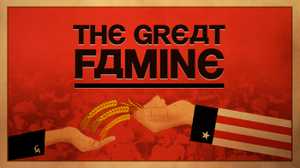
 The Great Famine
The Great Famine